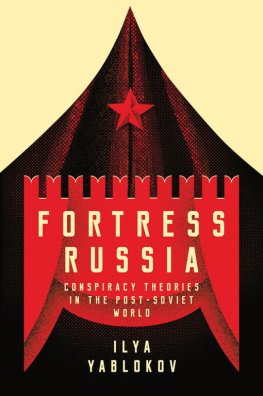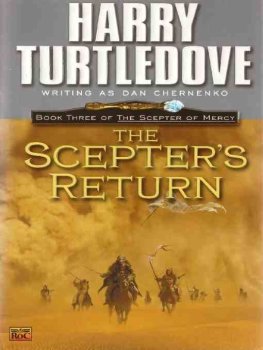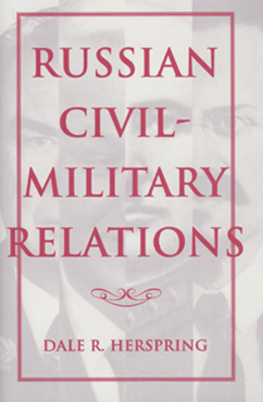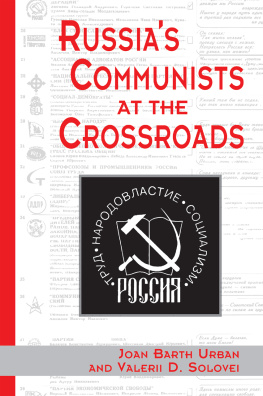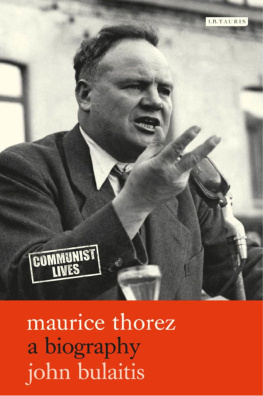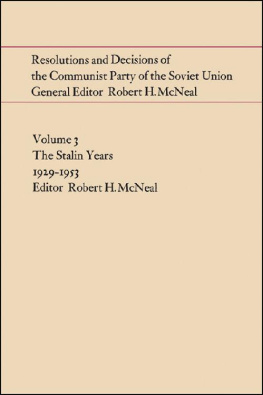First published 1989 by Transaction Publishers
Published 2019 by Routledge
2 Park Square, Milton Park, Abingdon, Oxon OX14 4RN
52 Vanderbilt Avenue, New York, NY 10017
First issued in paperback 2019
Routledge is an imprint of the Taylor & Francis Group, an informa business
Copyright 1989 Taylor & Francis
All rights reserved. No part of this book may be reprinted or reproduced or utilised in any form or by any electronic, mechanical, or other means, now known or hereafter invented, including photocopying and recording, or in any information storage or retrieval system, without permission in writing from the publishers.
Notice:
Product or corporate names may be trademarks or registered trademarks, and are used only for identification and explanation without intent to infringe.
Library of Congress Catalog Number: 88-19993
Library of Congress Cataloging-in-Publication Data
Zemtsov, Ilya.
Chernenko : the last Bolshevik : the Soviet Union on the eve of
Perestroika / Ilya Zemtsov.
p. cm.
Bibliography: p.
Includes index.
ISBN 0-88738-260-6
1. Chernenko, K. U. (Konstantin Ustinovich), 1911- . 2. Soviet
Union Politics and government 1982- 3. Heads of state Soviet
Union Biography. I. Title.
DK275.C45Z46 1988
947.0850924dc19
[B]
88-19993
CIP
ISBN 13: 978-1-138-50801-9 (pbk)
ISBN 13: 978-0-88738-260-4 (hbk)
The quirks and caprices of history are often surprising. They often turn mediocre personalities into famous statesmen, or contrariwise, deliver outstanding and original figures to undeserved oblivion.
Chance and circumstance combined to create the image of Chernenko as a mediocre, even pitiable figure. In actuality this image was merely a disguise that enabled him to ascend unnoticed the sharp and slippery slopes of power to the very apex of the Soviet pyramid. He remained in power very briefly, barely more than a year. Nevertheless, without an understanding of the qualities of his personality and the course of his career, modern Soviet history would be incomplete and the nature of the political changes being urged on the Soviet Union by his successor, Gorbachev, less comprehensible.
It was not a simple matter to get rid of the half-truths and misconceptions that had built up around Chernenkos person. Platitudes and superficialities usually prove resistant to the truth. I must admit that in trying to rectify them, I have often relied on evidence that is not public. First, I have relied on my own impressions of the man derived from the few occasions on which I met him. Second, I have made much use of hearsay, of reminiscences and impressions of people who knew Chernenko and worked with him. This does not mean, of course, that I just repeated what I received from such sources. Not at all. Well aware that much about Chernenko that has reached my ears could not be true, I have treated it as a point of departure for indirect inferences rather than as evidence that could be relied upon directly. In drawing such inferences, my familiarity with Soviet history and, in particular, with subcultural peculiarities of the Soviet power elites was of much help. More important by far, however, was public evidence at my disposal: primarily Chernenkos own writings. Not without a certain initial surprise, I found that Chernenkos political views and principles were revealed in them more fully than in his political life-history.
On the whole my purpose has been not to stick doggedly to evidence in search of a rather spurious certitude but to extract from it maximum knowledge, even if hypothetical in character. To explain the process of extracting relatively rich knowledge from relatively poor evidence, let me consider for a while any closed institutionbe it a prison or army barracks or a ship or a boarding schoolas a situational model. The stricter the institutions regimen, the lesser the likelihood of its regulations being violated, which means that once we know the regulations, we are in a position to predict the location and the behavior of any single inmate at any particular time. True, the possiblity of error remains; to the sorrow of professional managers and administrators, there is no such thing in this world as perfect rule enforcement. But under a very strict regimen, the probability of deviation from the rules becomes so small that for practical purposes it can be disregarded. It is exactly the standardization of conduct and the suppression of conflict in closed institutions that leave wide room for the prognostication of individual behavior.
What is true of microsystems, such as closed institutions, is true of macrosystems, such as, for example, totalitarian societies. The USSR is a land of uniformities caused by a variety of factors: indoctrination, regimentation, police terror and resultant intimidation, absence of opportunities for display of individual initiative, and even the imponderable but very tangible mood of all-pervasive grayness of life and boredom. All these factors conspire to obliterate personal differences, whether in attitudes or in behavior, in daily schedules, in interests pursued, and even in human characters and personalities. The only major differentiating factor is that of social roles: entirely different sets of proscriptions and prescriptions regulate, for example, the behavior of high-ranking Communist Party members and of ordinary Soviet citizens. But in either case, the regulations, however different, are highly standardized, covering the minutest details.
In achieving a uniformizing effect, written laws, statutes and regulations are not alone. There are many unwritten rules whose content and modes of enforcement are understood by everyone without verbalization. Furthermore, the cultural gap between the USSR and the rest of the world has resulted in a high degree of cultural uniformity. Meanings attached to human interactions, although tacit, are typically shared across the nation. Likewise, every Soviet citizen is from early days of life exposed to insistent, obtrusive, and strident indoctrination. The contents of this indoctrination may somewhat vary from one level of political initiation to another, but at each level, beginning with the Politburo and ending with some forsaken village lost in the expanses of Siberia, it produces individuals strikingly similar to one another in attitudes and behavior.
And finally, there is intimidation by police terror, always present even if varying in intensity from one period of Soviet history to another. Not without significance for the present book is the fact that police terror was at its ghastly peak during Stalins rule, i.e. in the early days of Chernenkos political career, recounted here in . Although direct evidence pertaining to this period of Chernenkos life has been the poorest, the assumption that in those days he behaved in exactly the same manner as all others at his level of political hierarchy has been the surest.
The reader will be perhaps surprised by my frequent use of verba sentiendi in relation to Chernenko, i.e. by my speaking about what Chernenko thought, felt, experienced, understood, desired, hoped for, or feared. Certainly, such phrases are not to be interpreted as mind reading on my part but merely as expressions of my virtual certainty that under given sets of circumstances Chernenkos mental life was hardly distinguishable from that of others of his social station. Needless to say, the same holds true for my use of


